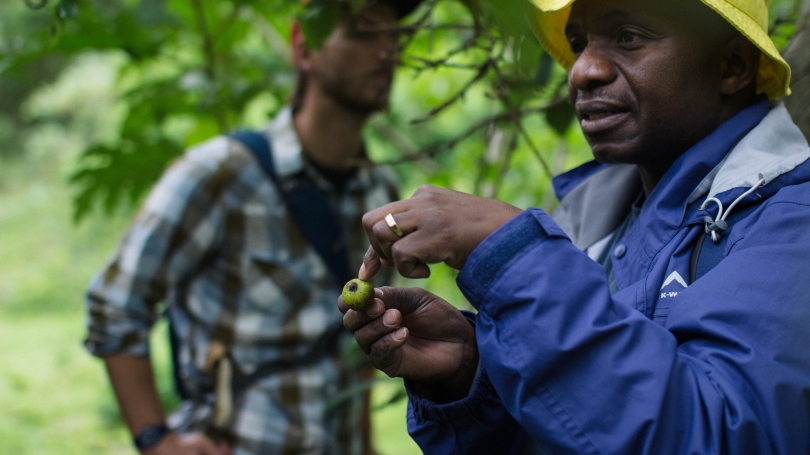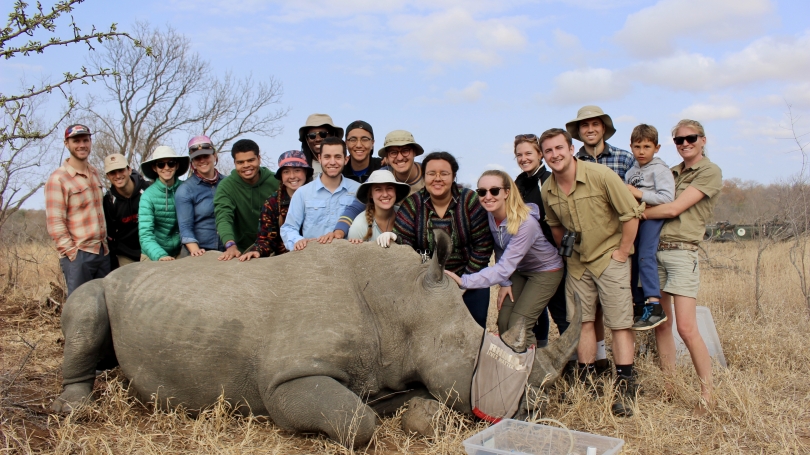
Environmental Studies FSP Southern Africa
Various Locations, NamibiaABOUT THIS PROGRAM
The Environmental Studies Department offers a foreign study program in Namibia. The program is heavily experiential: students spend the majority of their time directly engaging with local African landowners and staff at local NGOs and research centers under the guidance of the Dartmouth faculty. Courses are taught by multiple Dartmouth faculty.
This regional program gives students firsthand experience with resource use and management in southern Africa, with an emphasis on the intersection of conservation and human development. The region's climate is arid, the environment is fragile, and people often struggle to sustainably use and manage scarce common-pool resources such as land and water. Historical processes have also left many groups economically vulnerable and without access to important social and environmental services. As participants will observe, these conditions further magnify environmental issues.
Enrollment Information
About 16 students are selected for the program.
For more information about applying for this program, see our webpage on How to Apply & our FAQs under section 2 (How to Apply: Application)
THE STUDY ABROAD EXPERIENCE
ACADEMIC PROGRAM
Faculty Director
 Douglas Thomas Bolger Professor of Environmental Studies Adjunct Professor of Biological Sciences
Douglas Thomas Bolger Professor of Environmental Studies Adjunct Professor of Biological Sciences Curriculum
ENVS | 40 | 90:
Natural Resources and Environmental Issues
ENVS | 42 | 90:
Social and Political Aspects of Development and Conservation
ENVS | 84 | 90:
Seminar on Environmental Issues of Southern Africa
Prerequisites
This program is limited to juniors and seniors.
One of the following courses in preparation.
(Availability subject to change):
AAAS 11/ANTH 12.23: Intro to African Studies
AAAS 14/HIST 5.1: Pre-Colonial African History
AAAS 15/HIST 66: History of Africa since 1800
AAAS 19/HIST 5.8: Africa and the World
AAAS 40/WGST 34.2: Gender Identities and Politics in Africa
AAAS 42/REL 66/WGST 44.03: Women, Religion and Social Change in Africa
AAAS 44/ANTH 36: Anthropology and Contemporary Africa: Exploring Myths, Engaging Realities
AAAS 46/HIST 67: History of Modern South Africa
AAAS 50/ENVS 45/HIST 75: Colonialism, Development, and the Environment in Africa and Asia
AAAS 51/COLT 51: African Literatures: Masterpieces of Literatures from Africa
AAAS 54/THEA 23: Postcolonial African Drama
AAAS 83.02/GEOG 80: Food and the African World
AAAS 87.05/GOVT 42: Politics of Africa
AAAS 87.09/ANTH 12.14: African Popular Culture
AAAS 88.02/WGST 38.02/HIST 6.30: Women & Gender in the African Diaspora
GEOG 6/INTS 16: Introduction to International Development
Selection Criteria: There are few formal prerequisites to participate in the ENVS Africa FSP. The program benefits from having diverse perspectives among the student participants, and all majors are welcome to apply. What we do look for is individuals who are prepared to engage in a rigorous field-based educational experience.
Faculty Director
 Doug Bolger Professor of Environmental Studies
Doug Bolger Professor of Environmental Studies Curriculum
ENVS | 40 | 90:
Natural Resources and Environmental Issues
ENVS | 42 | 90:
Social and Political Aspects of Development and Conservation
ENVS | 84 | 90:
Seminar on Environmental Issues of Southern Africa
Prerequisites
This program is limited to juniors and seniors.
One of the following courses in preparation.
(Availability subject to change):
AAAS 11/ANTH 12.23: Intro to African Studies
AAAS 14/HIST 5.1: Pre-Colonial African History
AAAS 15/HIST 66: History of Africa since 1800
AAAS 19/HIST 5.8: Africa and the World
AAAS 40/WGST 34.2: Gender Identities and Politics in Africa
AAAS 42/REL 66/WGST 44.03: Women, Religion and Social Change in Africa
AAAS 44/ANTH 36: Anthropology and Contemporary Africa: Exploring Myths, Engaging Realities
AAAS 46/HIST 67: History of Modern South Africa
AAAS 50/ENVS 45/HIST 75: Colonialism, Development, and the Environment in Africa and Asia
AAAS 51/COLT 51: African Literatures: Masterpieces of Literatures from Africa
AAAS 54/THEA 23: Postcolonial African Drama
AAAS 83.02/GEOG 80: Food and the African World
AAAS 87.05/GOVT 42: Politics of Africa
AAAS 87.09/ANTH 12.14: African Popular Culture
AAAS 88.02/WGST 38.02/HIST 6.30: Women & Gender in the African Diaspora
GEOG 6/INTS 16: Introduction to International Development
Selection Criteria: There are few formal prerequisites to participate in the ENVS Africa FSP. The program benefits from having diverse perspectives among the student participants, and all majors are welcome to apply. What we do look for is individuals who are prepared to engage in a rigorous field-based educational experience.
STUDENT LIFE
The program involves considerable travel in Namibia. During much of the program students and faculty will be traveling and camping in safari tents.
For more information, please see the department website.
Financing Your Program
Tuition and Fees
The fees charged by the College for a Dartmouth-sponsored off-campus term of study include regular tuition charges for a term at Dartmouth, service fees, as well as the specific costs established for each off-campus study locale. In many programs, the room and board costs tend to be higher than for a term in Hanover. You can view a budget sheet for each program by clicking on the appropriate term under "Financing Your Program". The cost of transportation to and from the site is the responsibility of the student.
Financial Aid
In order that all qualified Dartmouth undergraduate students may have the opportunity to take part in off-campus programs, the College endeavors to adjust its normal financial aid awards for students already receiving aid. Tuition and expected family contribution for Dartmouth's off-campus programs are the same as for an on-campus term.
All costs, including airfare and spending money, are considered when determining the cost of an off-campus program. Any costs more than a typical term in Hanover are met with additional Dartmouth Scholarship Funds. If you have a work expectation for the term, this will be replaced by scholarship funding for programs that span the entire term.
Students are responsible for purchasing their own plane tickets and, in many cases, meals. Often, families find that they owe less for billable items for study away terms but will instead use more of their expected family contribution towards indirect costs such as the flight and meals. For help sorting out who pays what and how, contacting the Financial Aid office is often advisable.
Financing your program | Financial Aid | Scholarships | Budgeting & Costs




 TBD
TBD